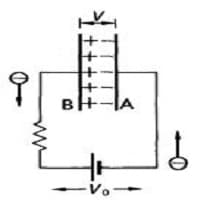How Does a Capacitor Store Energy

Many of the most important applications of capacitors depend on their ability to store energy and not accumulate and store charges. It just separates an equal amount of charges on either plate and keeps them there, storing potential energy by doing so.
When a capacitor is connected to a battery, electrons flow from the negative terminal of the battery onto the plate A of the capacitor connected to it. At the same rate, electrons flow from the other plate B of the capacitor towards the positive terminal of the battery. Positive and negative charges thus appear on the plates, and oppose the flow of electrons which cause them.

Due to voltage at the two ends of the capacitor, there is an electric field between the two plates, and this electric field keeps (or separate) the charges in their position.
The energy is stored in an electric field between the plates.
The electric potential energy stored in a charged capacitor is just equal to the amount of work required to charge it—that is, to separate opposite charges and place them on different conductors.
In summary
- Capacitor has equal magnitude of +ve and -ve charge
- Total charge on capacitor is zero or no resultant charge
- Energy stored because there is charge separation
Recommended: Notes on Capacitance of a capacitor
